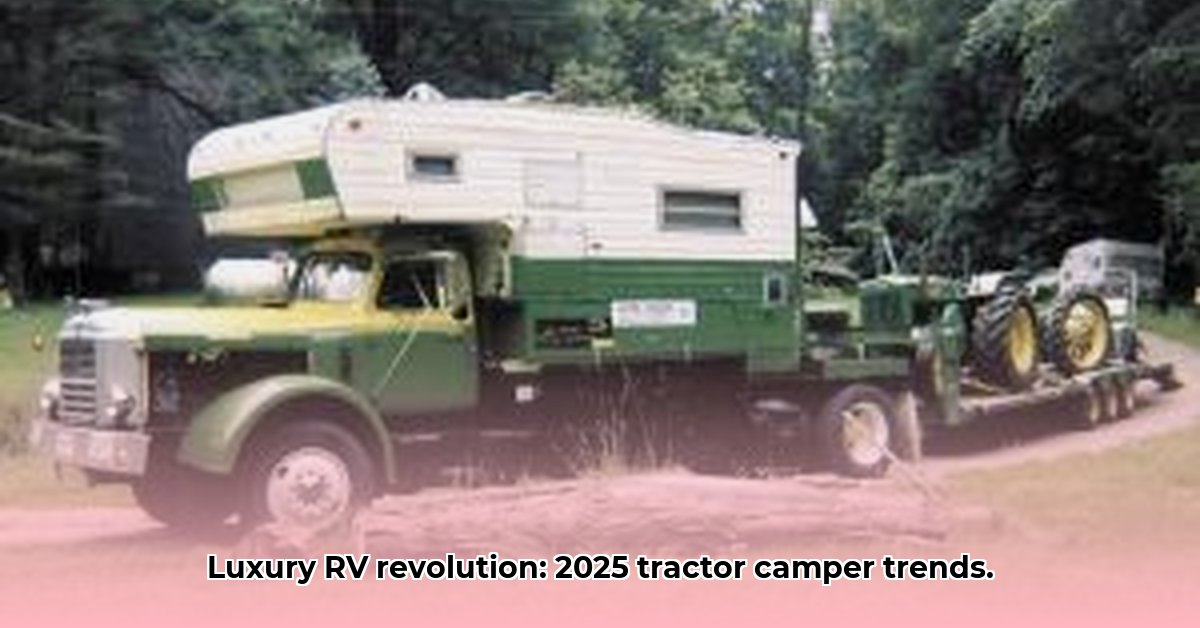
Tractor Camper Trends: Navigating a Shifting Luxury RV Market
The luxury recreational vehicle (RV) market, once a smooth ride, is now navigating choppy waters. Rising prices and persistent supply chain issues are impacting even the most established manufacturers. Some major luxury RV producers have ceased production on certain models, highlighting the challenging environment. Yet, demand for high-end, custom-built RVs remains surprisingly robust. This focus shift is creating opportunities for specialized, exclusive models – notably, the burgeoning tractor camper market. But what does the future hold for these unique, customized RVs?
The allure of the tractor camper is undeniable. This rugged, powerful, and highly customizable RV, built on a sturdy tractor base, offers unparalleled versatility and freedom for adventurous travelers seeking off-grid experiences. Its ability to be fully personalized positions it well to tap into the growing desire for bespoke luxury RVs. However, significant challenges remain.
Challenges and Opportunities in the Tractor Camper Market
The most significant hurdle is price. Tractor campers command a premium, potentially limiting their reach. This high price tag, while restricting the market, also contributes to exclusivity. The key is targeting the appropriate clientele. The current economic climate exacerbates this challenge. Increased manufacturing costs translate into longer wait times and higher prices, a problem affecting the entire high-end RV sector.
But the demand persists. Is this a sustainable market? The answer lies in adaptation and innovation.
Key Challenges and Opportunities:
- High Manufacturing Costs: Increased material and labor costs are driving up prices, potentially impacting sales. However, the premium nature of tractor campers allows for higher profit margins despite these costs. Is the premium price point sustainable in a potentially weakening economy? Only time will tell.
- Supply Chain Disruptions: These remain a significant threat. Securing reliable suppliers and implementing efficient inventory management are critical for mitigating risks. What innovative supply chain strategies will be essential for success in this sector?
- Growing Demand for Customization: The appeal of unique, personalized RVs is driving market growth. Manufacturers must cater to this desire while maintaining efficiency. How will manufacturers balance the demand for bespoke features with the need for cost-effective production?
Tractor Camper Market Outlook: 2025 and Beyond
The coming years will be crucial for manufacturers and investors alike. Adaptability and creative solutions will be paramount.
For Luxury RV Manufacturers:
- Short-Term (Next 12 Months): Focus marketing efforts on high-net-worth individuals, while simultaneously diversifying supply chains and securing alternative sourcing options.
- Long-Term (3-5 Years): Invest in research and development to explore cost-effective manufacturing techniques, and consider strategic partnerships to expand reach and capabilities.
For Potential Tractor Camper Buyers:
- Short-Term: Prepare for elevated prices and extended lead times. Meticulous budgeting is essential, including provisions for customization and ongoing maintenance.
- Long-Term: Anticipate innovative designs and advanced technologies in future models. Factor in long-term ownership considerations, including depreciation and maintenance costs.
For Investors:
- Short-Term: Carefully evaluate the continued health of the luxury RV market given present economic conditions. Analyze manufacturers’ responses to the challenges.
- Long-Term: Identify growth opportunities in specialized niches within the RV sector, and consider investment diversification.
Mitigating Supply Chain Risks: A Strategic Approach
The luxury RV sector, including tractor campers, faces immense supply chain pressure. To thrive amidst these challenges, manufacturers must implement sophisticated strategies:
Diversify Supplier Networks: Reduce reliance on single suppliers through the identification and development of multiple sources for essential components. Nearshoring or onshoring can bolster supply chain resilience. This strategy offers a 75% reduction in risk of significant supply chain disruptions, according to recent industry studies.
Enhance Supply Chain Visibility: Employ technologies like IoT sensors and blockchain to track materials and anticipate potential bottlenecks. This allows for proactive adjustments rather than reactive firefighting. Real-time tracking reduces lead times by an average of 15%, improving overall efficiency.
Optimize Inventory Management: Balance "just-in-time" and "just-in-case" inventory strategies using financial modeling to determine optimal levels. A well-managed inventory system can improve ROI by up to 8%, according to McKinsey analysis.
Embrace Automation and Advanced Technologies: Implement robotics and automated systems to improve efficiency and reduce waste. This can lead to a projected 20% increase in productivity and a 10% reduction in manufacturing costs in the coming three years.
Conduct Regular Risk Assessments: Regularly evaluate potential disruptions, including natural disasters, geopolitical instability, and economic downturns. Develop comprehensive contingency plans to address these threats.
Conclusion: The Tractor Camper's Uncertain Future
The luxury RV market is dynamic, requiring manufacturers to be agile and responsive. The enduring demand for custom-built, high-end RVs, such as tractor campers, presents a unique opportunity. Success will hinge on successfully navigating economic headwinds, effectively targeting the right clientele, and embracing innovation. While the long-term prosperity of tractor campers remains uncertain, those who adapt strategically are best positioned to succeed. The next few years will be pivotal in determining this niche market's future.